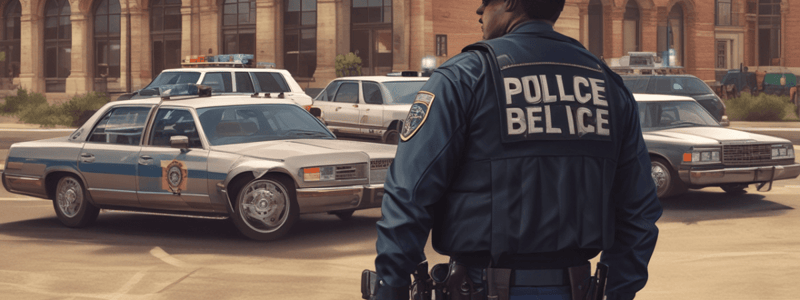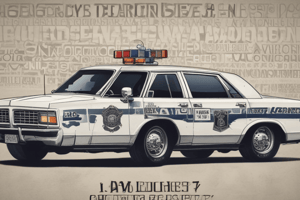Podcast
Questions and Answers
Match the following law enforcement terms with their definitions:
Match the following law enforcement terms with their definitions:
OBJECTIVELY REASONABLE = The determination that the necessity for using force is based on the totality of circumstances SERIOUS BODILY INJURY = An injury that involves a substantial risk of death or impairment of a body part SOFT EMPTY HAND CONTROL = Techniques that have minimal implications of injury TOTALITY OF CIRCUMSTANCES = All facts and circumstances known to the deputy at the time of a use of force decision
Match the law enforcement techniques with their descriptions:
Match the law enforcement techniques with their descriptions:
VASCULAR NECK RESTRAINTS = A technique that restricts the flow of blood to the brain SOFT EMPTY HAND CONTROL = Designed to control high levels of resistance TOTALITY OF CIRCUMSTANCES = A term used to refer to the deputy's evaluation of the situation OBJECTIVELY REASONABLE = A technique used for pain compliance
Match the law enforcement terms with their meanings:
Match the law enforcement terms with their meanings:
OBJECTIVELY REASONABLE = What a reasonable prudent deputy would do under similar circumstances TOTALITY OF CIRCUMSTANCES = The deputy's evaluation of the situation SERIOUS BODILY INJURY = A minor injury that requires medical attention SOFT EMPTY HAND CONTROL = A technique used for high-risk situations
Match the law enforcement concepts with their applications:
Match the law enforcement concepts with their applications:
Match the law enforcement terms with their characteristics:
Match the law enforcement terms with their characteristics:
Match the law enforcement concepts with their purposes:
Match the law enforcement concepts with their purposes:
Match the following terms with their definitions:
Match the following terms with their definitions:
Match the following terms with their definitions:
Match the following terms with their definitions:
Match the following terms with their definitions:
Match the following terms with their definitions:
Match the following terms with their definitions:
Match the following terms with their definitions:
Match the following terms with their definitions:
Match the following terms with their definitions:
Match the following terms with their definitions:
Match the following terms with their definitions:
Match the following terms with their definitions:
Match the following terms with their definitions:
Match the following terms with their definitions:
Match the following terms with their definitions:
Study Notes
Use of Force Definitions
- Chokehold: Intentional and prolonged application of force to the throat, windpipe, or airway that prevents the intake of air.
- Blue Team: Computer-based software program (IAPro) for documenting citizen complaints, use of force, K-9 utilization, and other Internal Affair related incidents, with an early intervention tool for flagging use of force incidents, K9 utilizations, and citizen complaints.
Deadly Force
- Any use of force that creates a substantial risk of causing death or serious bodily injury.
- Examples of deadly force: • Firearms • Impact weapon strikes to the head, neck, throat, or clavicle • Use of a vehicle against other occupied vehicles or pedestrians • Vascular Neck Restraints, Chokeholds, or other weaponless control techniques with a potential for severe injury or death • Use of specialty munitions (SIMS) to the head, neck, throat, or clavicle
Excessive Use of Force and Less-Lethal Force
- Excessive Use of Force: Use of force that exceeds the degree of force permitted by law, policy, or the observing deputy's employing agency.
- Less-Lethal Force: Any use of force other than deadly force that involves physical effort, or the use of agency-issued less-lethal equipment to control, restrain, or overcome resistance.
Objectively Reasonable and Serious Bodily Injury
- Objectively Reasonable: The determination that the necessity for using force and the level of force used is based on the deputy's evaluation of the situation in light of the totality of the circumstances known to the deputy at the time of the force used and upon what a reasonable prudent deputy would do under the same or similar situations.
- Serious Bodily Injury: An injury to a person that involves a substantial risk of death, serious disfigurement, or protracted loss or impairment of the function of a body part.
Soft Empty Hand Control and Totality of Circumstances
- Soft Empty Hand Control: Techniques that have minimal implications of injury, designed to control primarily low levels of resistance (e.g., pain compliance techniques, transporters, take-downs, and/or other "hands on" maneuvers/techniques).
- Totality of Circumstances: All facts and circumstances known to the deputy at the time or reasonably perceived by the deputy as the basis for a use of force decision, including the suspect's form of resistance, all reasonably perceived factors that may have an effect on the situation, and the response options available to the deputy.
Vascular Neck Restraints
- A technique that can be used to incapacitate individuals by restricting the flow of blood to their brain.
Studying That Suits You
Use AI to generate personalized quizzes and flashcards to suit your learning preferences.
Description
Test your knowledge of law enforcement terminology, including definitions of chokehold and Blue Team.




